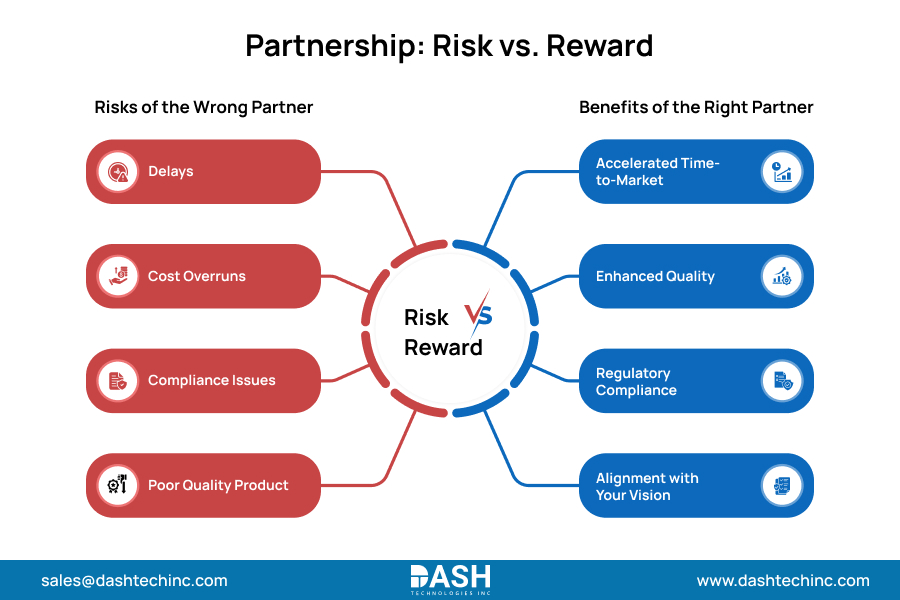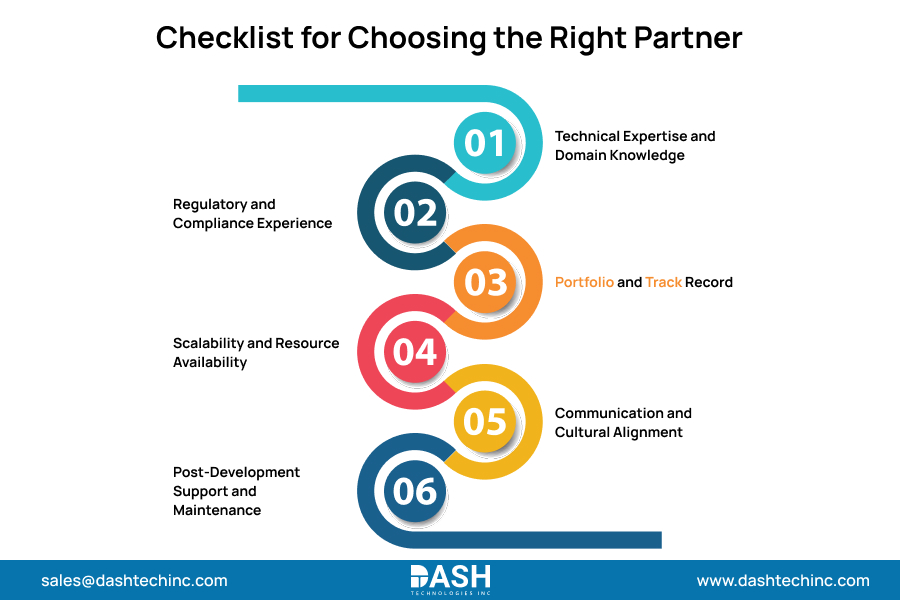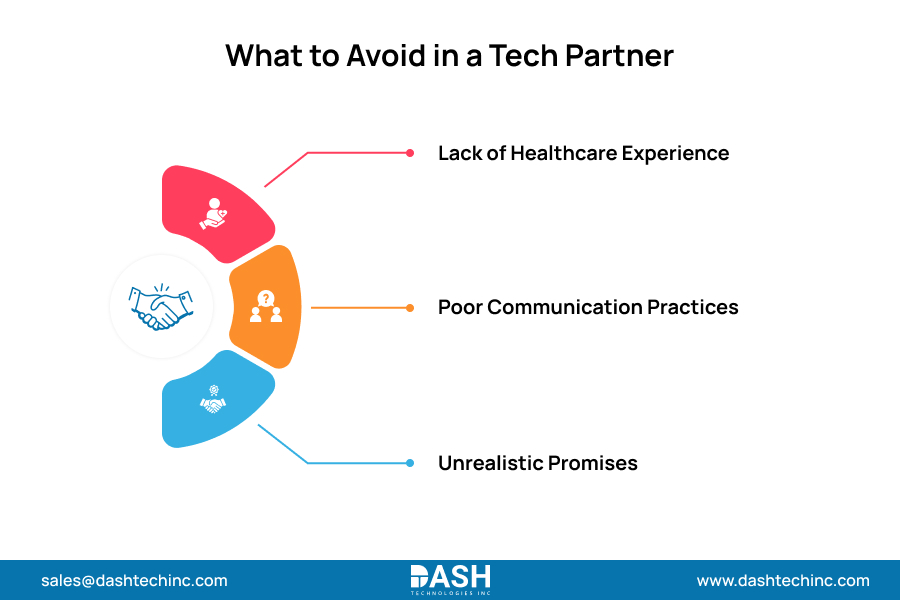How to Choose the Right Healthcare Product Engineering Partner?
Choosing the right product engineering partner can make or break your innovation journey. The success of your medical device, including its time-to-market and regulatory compliance, depends heavily on the partner you choose during your healthcare startup launch or as an established MedTech company broadening your product offerings.
Product engineering services in healthcare often face high stakes, as they must overcome complex regulatory challenges while developing solutions that can save lives. From EMR systems to AI-powered diagnostic tools, healthcare software engineering requires specialized expertise that goes far beyond traditional software development. In this blog, we’ll be taking a look at the key considerations and red flags to avoid while choosing a product engineering partner.
Why Choosing the Right Partner Matters

Selecting the right product engineering partner is not only smart, but it can also make or break your project (along with it, your bank). The wrong partner can lead to significant setbacks, including:
- Delays: Poor communication or insufficient skill can cause you to miss deadlines, which slows down your product release.
- Cost Overruns: Inefficiencies and rework can push budgets upwards, overextending resources.
- Compliance Problems: Failure to comply with laws such as HIPAA or FDA regulations in healthcare can have legal as well as monetary consequences.
- Poor Quality: A product that fails to meet user needs or integrate with existing systems can damage your reputation and profits.
By contrast, the appropriate collaborator provides significant advantages:
- Accelerated Time-to-Market: Leveraging their experience & effective strategy to bring your product to the marketplace sooner.
- Enhanced Quality: A reliable and user-friendly product that results from rigorous quality assurance processes.
- Regulatory Compliance: Expertise in healthcare regulations allows your product to meet essential standards.
- Alignment with Your Vision: A collaborative partner shares your values and works toward your goals, fostering innovation.
For healthcare and MedTech companies, where patient safety and regulatory adherence are extremely important, choosing a partner with both technical and domain expertise is critical to success.
Key Factors to Evaluate When Selecting Your Partner

Technical Expertise and Domain Knowledge
Your engineering partner must demonstrate excellent technical expertise in your domain of work. For a healthcare business, this involves having experience with medical device engineering, EMR/EHR integration, medical imaging software, & telehealth systems.
Seek out partners who have overcome the complexities of healthcare software engineering. They must be experienced in PACS, DICOM, & HL7 FHIR standards with proficiency in on-site & cloud-based solutions. Modern healthcare solutions require extensive expertise, demonstrated through the integration of wearable technology, advanced medical imaging management, & the development of AI-powered analytics platforms.
Regulatory and Compliance Experience
Your partner must have demonstrated expertise in ISO 13485, FDA legislation, HIPAA compliance, and other applicable standards. They should understand the documentation requirements, risk management processes, and quality management systems necessary for regulatory approval.
A MedTech regulatory expert can anticipate requirements and recommend various methods to expedite the approval process. Partners with MedTech expertise should navigate products through 510(k) submissions or IDE approvals to show their knowledge and understanding of medical device development.
Cost vs. Value
Cost remains significant, but value should ultimately take precedence. Hiring a professional firm with greater upfront costs helps avoid expensive future corrections and saves money over time. The Minimum Viable Product (MVP) method enables early market testing, which minimizes risk while directing development efforts effectively. The selected partner must offer both quality and cost efficiency to achieve maximum benefits.
Portfolio and Track Record
Carefully review your potential partner’s portfolio. Look for projects that are similar to yours in size, complexity, and regulatory needs. A good portfolio must demonstrate successful results across various healthcare segments, from enterprise healthcare software to integration with medical devices.
Client testimonials provide valuable insights into the partner’s work ethic, communication style, and ability to deliver on promises. Pay attention to feedback about their responsiveness to issues, dedication to project success, and ability to act as a true partner rather than just a vendor.
Scalability and Resource Availability
Your engineering requirements will change as your project matures. Make sure your partner possesses the talent pools and infrastructure to scale your needs. This means they should be able to provide niche skills, scale team size rapidly, and flexible engagement models that can respond to shifting project needs.
Communication and Cultural Alignment
Effective communication is crucial for project success. During partner selection, assess their communication strategies and responsiveness, as well as their level of openness. Effective communication partners must deliver consistent updates while maintaining open feedback channels and demonstrating teamwork in problem-solving.
Organizations often underestimate the importance of cultural fit in their operations. Seek partners who demonstrate similar work ethics while also valuing healthcare innovation together with you. A partnership relationship needs to extend naturally from your team with shared goals and mutual respect.
Post-Development Support and Maintenance
The lifecycle of healthcare products demands continuous support alongside regular updates and maintenance. Your partner must deliver extensive post-deployment services that encompass bug fixes, feature enhancements, and regulatory updates. Your partner needs to provide extended support throughout your product’s lifecycle as it evolves and expands.
Engagement Models and Partnership Structures
Project-Based Engagement
Project-based engagement provides predictable costs and deliverables when working with well-defined projects that have clear scope and timelines. The model proves effective when applied to distinct product features, system integrations, and regulatory compliance updates.
Dedicated Team Model
When you need ongoing development capacity, a dedicated team model provides flexibility and scalability. Your partner assigns specific engineers to your project, giving you direct access to their expertise while maintaining cost efficiency.
Full Product Ownership
Full product ownership models enable your partner to handle all development aspects while organizations concentrate on their core business. By following this method, teams can deliver faster and release internal staff to handle other tasks.
Red Flags to Avoid

Lack of Healthcare Experience
Inexperienced healthcare partners often fail to fully grasp the extent of regulatory requirements and patient safety standards, as well as the specialized challenges inherent in creating medical software. Healthcare-specific experience delivers essential context that expertise from other regulated sectors cannot completely replace.
Poor Communication Practices
A potential partner who fails to respond promptly during evaluations may demonstrate unclear communication practices or refuse to disclose detailed process information, indicating potential obstacles to future collaboration.
Unrealistic Promises
Avoid partners who offer unrealistically quick timelines, significantly discounted rates, or guaranteed regulatory approval. Healthcare product development has risks and complexities inherent in the process, and experienced partners anticipate these at the outset.
Build a Successful Partnership with Dash Technologies
After choosing Dash Technologies as your product engineering partner, we will work toward establishing a strong collaborative partnership. Your partnership with Dash Technologies begins by establishing clear communication channels, defining roles and responsibilities, while also setting up systems for continuous feedback and adjustments.
At Dash Technologies, our approach is to work closely with clients as genuine partners, rather than mere vendors. Openly share your vision so our experts can join strategic discussions and celebrate achievements together. Our engineering services provide technical solutions that support your goal of achieving improved patient outcomes.
Successful partnerships develop when organizations demonstrate mutual respect while pursuing shared objectives together through transparent communication. The specialized field of healthcare software engineering demands dedicated partners who prioritize your success as Dash Technologies does. Contact us to experience the future today!
About Dash

Dash Technologies Inc.
We’re technology experts with a passion for bringing concepts to life. By leveraging a unique, consultative process and an agile development approach, we translate business challenges into technology solutions Get in touch.







